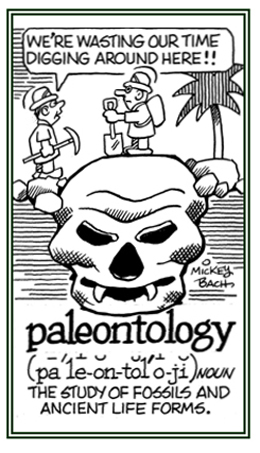-ology, -logy, -ologist, -logist
The word -ology is a back-formation from the names of certain disciplines. The -logy element basically means "the study of ____". Such words are formed from Greek or Latin roots with the terminal -logy derived from the Greek suffix -λογια (-logia), speaking, from λεγειν (legein), "to speak".
The suffix -ology is considered to be misleading sometimes as when the "o" is actually part of the word stem that receives the -logy ending; such as, bio + logy.
Through the years -ology and -logy have come to mean, "study of" or "science of" and either of these suffixes often utilize the form of -ologist, "one who (whatever the preceding element refers to)".
The examples shown in this unit represent just a small fraction of the many words that exist in various dictionaries.
paleology
(s) (noun), paleologies
(pl)
paleometeorology
The study of atmospheric conditions at periods in the geological past.
paleontology
(s) (noun), paleontologies
(pl)
The study of ancient life on earth; especially, the study of fossils or by using fossil evidence: Viola is very interested in prehistoric forms of existence; so, she wants to study
paleontology, which is concerned with the petrified remains of animals, plants, and other organisms from earlier times.
 © ALL rights are reserved.
© ALL rights are reserved.
Go to this Word A Day Revisited Index
so you can see more of Mickey Bach's cartoons.
paleo-ornithology
The study of birds which existed in ancient times
paleopsychic
A reference to the assumed (prehistoric) origins of behavior patterns in humans.
paleoseismology, paleoseismologic, paleoseismological
The detailed study of landforms across fault zones, analysis of deformed layers of sediment in the walls of trenches excavated across active faults and the determination of the age of carbonaceous material found in the sediments, using radiometric techniques. Specialists have gone back into earthquake history, not in terms of years or decades, but in terms of centuries to arrive at long-term patterns.
paleozoology
(s) (noun) (no pl)
A subdivision of paleontology that is the study of fossil animals: Mandy was certainly interested in petrified remains of the geological past and decided to specialize in paleozoology and learn more about prehistoric animals and their evolution.
papyrology
The study of papyri, including ancient papyrus manuscripts.
parachronology
(s) (noun), parachronologies
(pl)
In geology, a functional way of the dating and correlation of groups of rock strata: Parachronology within geochronology deals with fossils that either supplement or take the place of biostratigraphically significant fossils.
parapsychology
1. The science or study of phenomena that lie outside the sphere of orthodox psychology.
2. The study of extrasensory perception, such as thought transference (telepathy) and clairvoyance.
3. The branch of psychology dealing with the study of psychic phenomena; such as, extrasensory perception, clairvoyance, and telepathy, that appear to fall beyond the scope of physical law.
parasitologist
(s) (noun), parasitologists
(pl)
An expert in parasitology: Dr. Smart was a parasitologist and was the best specialist in the field of parasites at the university.
parasitology
(s) (noun) (no pl)
The science or study of parasites and parasitism: Parasitology is a field of biology that specializes in parasites, particularly those of animals and plants.



